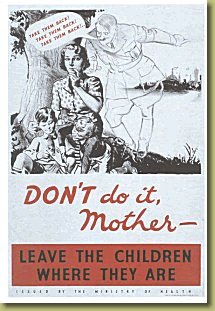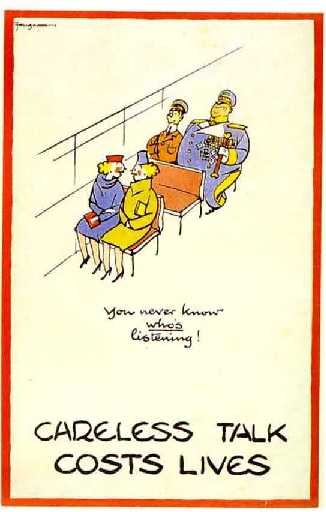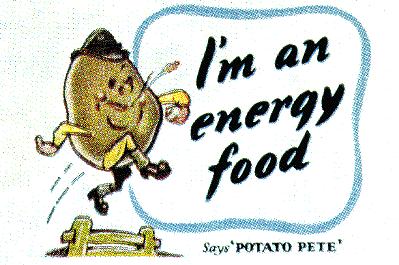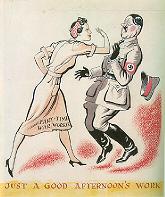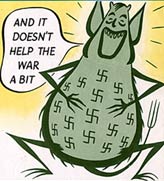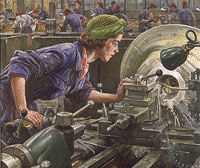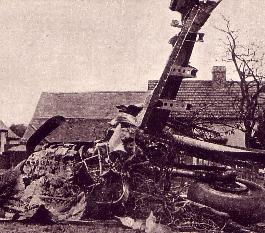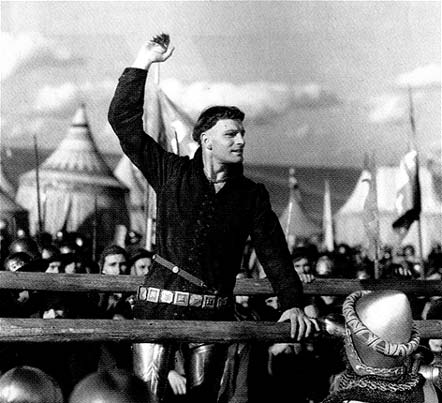|
|
|
|
Propaganda means spreading ideas and opinions. Some of these opinions may be true; others may be false. The aim is the same - to get people to believe them. Every government does it in wartime. It gets people to think what it wants them to think. JF Aylett, The Home Front (1988)
Propaganda is a sort of advertising. In wartime, governments use propaganda to persuade people to support the war. Their propaganda is 'national advertising'. Fiona Reynoldson, Propaganda (1991)
|
Going DeeperThe following links will help you widen your knowledge: Basic accounts from The BBC at War - Homefront programming |
|
As soon as the war began, the government formed the Ministry of Information to regulate all the news and propaganda. At its height, 3000 people worked for the MoI
As the war went on, however, the MoI improved. A huge opinion survey - called Mass Observation - kept track of people's opinions and feelings, and the MoI learned what to do to influence people properly. One technique - which came as a bit of a surprise - was to tell people bad news as well as good. People believed what they heard when it was not all good, and the MoI found that people could cope with setbacks.
|
Source A
Another early MoI failure. The poster did not persuade mothers to leave their children in the country - in fact, it reminded them of how much they wanted to bring their children back home.
|
|
The government used a number of different methods to control people's thoughts and feelings:
1. Censorship Censorship is stopping certain types of information: • Certain pieces of news were not broadcast because the MoI thought they would damage morale (e.g. the government covered up reports of ships sunk by Japanese kamikaze pilots). • Certain photos were banned (e.g. those showing dead children, and one of a bomb which had broken through into an Underground station). • The Communist newspaper The Daily Worker was banned in 1941 because it opposed the war. • Soldiers' letters were censored to delete all mention of times and places. • Early in the war, the MoI kept the invention of radar secret - instead, it said that RAF pilots had been eating carrots and could see in the dark. |
|
|
2. Wireless The MoI had the right to control the BBC - although it never did; the BBC voluntarily controlled the flow of information in a sensible way. In 1939, the BBC was expanded to 23 transmitters and 4233 employees. • The BBC broadcast the news. It avoided comment, and just gave the facts. BBC newsreaders were expected always to remain calm, and they had to dress smartly, even though they were on the wireless! All over Europe, people listened in because they believed the BBC. • In September 1939, the BBC started to broadcast Tommy Handley's comedy programme: It's That Man Again! (ITMA). Comedy was found to be a wonderful way of keeping up moral. • In June 1940, JB Priestley began his very popular Postscripts programme - inspirational talks immediately after the news: for example, after the withdrawal from Dunkirk, he gave a talk which more than anything else helped to create the 'myth' of Dunkirk as an heroic success (Source B). • In 1940, the programme Music While You Work was launched - it helped keep production workers cheerful. • The Kitchen Front suggested recipes for mothers struggling to cope with rationing. |
Did You KnowBBC newsreaders developed the habit of starting the news by saying: 'Here is the news; and this is [e.g. Alvar Lidell] reading it' which newsreaders still do today. They did this so that listeners would come to be able to recognise their voice - and therefore would be able to tell if it was a fake enemy broadcast.
Source BI wonder how many of you feel as I do about this great Battle and evacuation of Dunkirk.... When apparently all was lost, so much was gloriously retrieved.... What strikes me about it is how typically English it is.... And to my mind what was most characteristically English about it was the part played not by the warships but by the little pleasure-steamers. We've known them and laughed at them, these fussy little steamers, all our lives. These 'Brighton Belles' and 'Brighton Queens' left that innocent foolish world of theirs to sail into the inferno, to defy bombs, shells, magnetic mines, torpedoes, machine-gun fire - to rescue our soldiers. JB Priestley, Postcripts (5 June 1940).
|
|
3. Posters
Source CMany different kinds of poster - from silly cartoons such as 'Dr Carrot' and 'Potato Pete' to high art such as 'Ruby Loftus cutting a breech-ring' - were produced, but the most successful were the humorous 'Careless Talk Costs Lives' posters produced by Kenneth Bird ('Fougasse'). |
Source DIn just one short walk I counted 48 official posters ... on hoardings, shelters, buildings, including ones to tell you to eat National Wholemeal Bread, not to waste food, to keep your children in the country, to know where the rest centre is, how to behave in an air raid shelter, to look out in the black-out, to look out for poison gas, to carry your gas mask always, to join the ATS, to fall in with the fire bomb fighters, to register for Civil Defence duties, to help build a plane, to recruit for the Air Training Corps, to save for Victory. Member of the public interviewed by Mass Observation.
|
Source E
'Potato Pete' tried to persuade housewives to use potatoes instead of bread. |
Source F
'Just a Good Afternoon's Work' This poster was designed to encourage women to become part-time workers.
|
Source G
The 'squanderbug' - covered in swastikas - tried to get people to waste their ration tokens.
|
Source H
Ruby Loftus cutting a breech-ring; a painting by Dame Laura Knight. A 21-year-old woman from Newport, Wales, Ruby was a skilled machinist in a weapons factory. The painting was used as a recruiting poster.
|
|
4. Churchill's speeches Inspired people. What few people know is that Churchill was too busy to record the speeches for the BBC, and many of them were recorded by an impressionist. |
Source IWe shall go on to the end, we shall fight in France, we shall fight on the seas and oceans, we shall fight with growing confidence and growing strength in the air, we shall defend our Island, whatever the cost may be, we shall fight on the beaches, we shall fight on the landing grounds, we shall fight in the fields and in the streets, we shall fight in the hills; we shall never surrender Speech by Winston Churchill, 4th June 1940.
|
|
5. Booklets and pamphlets Pamphlets were published on many practical topics, such as gardening. However, the government also published factual accounts of the war effort. One of these was especially successful: Front Line 1940-1 told the story of the Civil Defence Services during the Battle of Britain and the Blitz. It contained many facts and figures, and carefully selected photos, which had just the right balance to make people determined, without demoralising them. |
Source I
'Good shooting! A German bomber brought down in a Midland farmyard' - a typical picture from the booklet: Roof Over Britain: The official story of the AA defences 1939-42 (published by the government and sold for 9d - about 4p).
|
|
6. Cinema 'Going to the movies' was a major part of people's recreational time, and the film-makers produced films about heroism and patriotism such as: • In Which We Serve (1943) - the heroic story of the ship HMS Torrin, sunk by a torpedo. • Henry V (1944) included the British victory against the odds at Agincourt, and the stirring speech "on St Crispin's Day". Other films amused people, or provided romances which allowed them to 'escape' the worries and hardships of life. Also at the cinema, newsreels, often accompanied by stirring words and heroic music, provided images of the fighting, or reminders of what people were fighting for. One especially powerful film was Target for Tonight - the story of a bombing raid over Germany.
7. Black Propaganda 'Black Propaganda' is where the government aims messages at the enemy population, trying to confuse or demoralise them. Perhaps the most well-known example of this was William Joyce, who broadcast 'news' from Germany every night, telling the British people that the war was hopeless and that they were being defeated. His posh, sing-song accent - 'This is Jarmany calling' - led people to nickname him Lord Haw-Haw. Although it was forbidden, some 6 million people tuned in to hear him every night - mainly to have a laugh at his accent and exaggerated claims. The British, however, also set up the Political Warfare Executive (PWE) which published 'black propaganda': • they dropped a regular 36-page mini-magazine, with lots of interesting reading ... plus anti-Nazi messages! • they dropped 'Down With Hitler' stickers. • the journalist Sefton Delmar ran a bogus 'German' radio programme Gustav Siegfried Eins which pretended to be anti-British, but also attacked Hitler. The BBC monitored foreign radio broadcasts, so the MoI experts could make the programme sound very convincing. The Nazis were so worried that they made listening to it an offence carrying the death penalty.
|
Source I
Laurence Olivier, playing Henry V, stirs his soldiers to heroism by his famous 'St Crispin's Day' speech
|
|
|
|
|
Spotted an error on this page? Broken link? Anything missing? Let me know. |
|
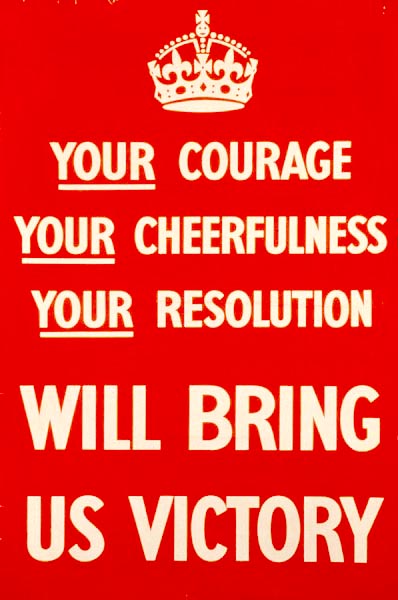 At first, it was not very successful. It recruited authors to write leaflets, but some of them were not very good at it. Agatha Christie refused to do it because she felt she could only write what she believed. Loudspeaker vans did not get the message across to enough people. Leaflets dropped into Germany were full of grammatical and spelling errors. One early poster - to join the ATS - had to be withdrawn because the drawing of the woman was thought to be too sexy. Another early poster - 'Your courage, your cheerfulness ...
will bring us victory' - just annoyed people because it seemed like 'them' and
'us'; why, people asked, should they work so the government can win the war?
At first, it was not very successful. It recruited authors to write leaflets, but some of them were not very good at it. Agatha Christie refused to do it because she felt she could only write what she believed. Loudspeaker vans did not get the message across to enough people. Leaflets dropped into Germany were full of grammatical and spelling errors. One early poster - to join the ATS - had to be withdrawn because the drawing of the woman was thought to be too sexy. Another early poster - 'Your courage, your cheerfulness ...
will bring us victory' - just annoyed people because it seemed like 'them' and
'us'; why, people asked, should they work so the government can win the war?
